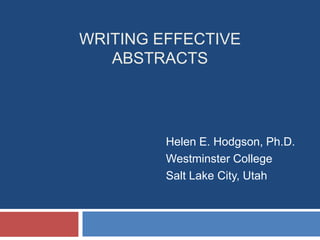
Writing effective abstracts
- 1. WRITING EFFECTIVE ABSTRACTS Helen E. Hodgson, Ph.D. Westminster College Salt Lake City, Utah
- 2. What is an Abstract? An abbreviated, accurate representation of a document without added interpretation or criticism Two general types Indicative (descriptive) Informative
- 3. Why is an Abstract Important? It is the part of the article that is read most often. For some readers, it is the only part read. Other readers use it to determine whether the article is worth reading. Researchers use it to determine the relevance of the research to their work. For conferences, it is often the sole criterion on which a presentation is judged.
- 4. What are the Differences Between Indicative and Informative Abstracts? Characteristic Indicative Informative Function (and alternate name) Descriptive Comprehensiv e Content Qualitative Qualitative and quantitative Substitute for document No Yes Use(s) Descriptive papers, new methods, Experimental findings Characteristic Indicative Informative Function (and alternate name) Descriptive Comprehensive Content Qualitative Qualitative and quantitative Substitute for document No Yes Use(s) Descriptive papers, new methods, review articles Experimental findings
- 5. Special Types of Abstracts Abstracts of the same document can be prepared in different formats for different publications or purposes. Case report abstract Meeting abstract
- 6. What is the Anatomy of a Typical…? Journal Article (IMRAD) Introduction Materials and Methods Results and Discussion and Conclusion(s) Structured Abstract Objective Design, Setting, Study Subjects, Interventions Main Measurements and Results Conclusion(s) Ann Intern Med 1987;106:598-604.
- 7. What is the Function of Each Part of an Experimental Article? Introduction Provides context for study question (optional in abstract) Clearly and precisely states study objective(s) or hypothesis Materials and Methods Briefly describes study design, setting, study subjects, interventions, and statistical methods
- 8. Function of Each Part of an Experimental Article—Continued Results Provides key results, including methods of assessing subjects and statistical results Discussion Article: Highlights, without repeating, ―Results‖ Abstract: Excludes ―Discussion‖ or combines with ―Conclusion(s)‖ Conclusion(s) Directly answers study objective
- 9. What Phrases Help Signal the Reader? To determine whether . . ., we . . . . We found that. . . . We conclude that . . . . Zeiger, Essentials of Writing Biomedical Research Papers, 2000. Zeiger. Essentials of Writing Biomedical Research Papers 2000.
- 10. What is the Best Approach to Writing an Abstract? Start with the journal’s instructions for authors. Review sample abstracts from the target journal. Remember that the abstract will be published by itself and should be self- contained.
- 11. What are the Main Problems with Abstracts? Incomplete Inaccurate Misleading Poorly organized Lacking in coherence Excessively detailed
- 12. What are the Qualities of an Effective Abstract? Is both clear and concise Conforms to required length limit (usually 250 words) Stresses the most important aspects of the study Avoids general statements Contains nothing that is not found in the body of the article
- 13. Writing Style and Hints The generally accepted rules for good writing apply to the writing of abstracts: Write concisely and clearly, making each sentence highly informative. Write in fluent, simple prose and make clear, direct statements. Be exact and unambiguous; avoid generalizing whenever possible.
- 14. Writing Style and Hints—Continued Condense, but do not interpret, the content of the report. Indicate the scope of the research in the opening sentence without repeating the title. Begin with a statement of the Objective, not with the phrase ―This report . . .‖ Indicate the treatment of the subject (eg, brief or exhaustive, case history or survey, etc).
- 15. Writing Style and Hints—Continued Use complete sentences unless the journal allows fragments in structured abstracts (eg, objective or setting). Be brief, but avoid terseness and cryptic comments. Use the past tense. Use active voice, especially for informative abstracts. Passive: B was exceeded by A. Active: A exceeded B.
- 16. Writing Style and Hints—Continued Avoid ―laboratory semantics,‖ repetition, and unnecessary words. Use trade jargon and abbreviations sparingly, defining them at first use. Maintain the tone and emphasis of the overall manuscript. Edit the abstract carefully, scrutinizing every word.
- 17. What Should Be Excluded from (most) Abstracts? Jargon and undefined abbreviations Detailed descriptions Examples Well-established facts Tables and graphs Excessive numerical results Speculation by author Information not in document References
- 18. The Introduction Consists of 1–3 sentences that introduce the topic and explain why it is important state the research question and, briefly, how you went about answering it
- 19. Ways to Reduce Word Count Use plurals to eliminate articles. Use abbreviations where permitted, defining at first use. Remove redundant words and phrases. Avoid nominalizations. Limit the use of prepositional phrases. Eliminate spaces between mathematical operators and numbers Avoid starting sentences with numbers that have to be spelled out.
- 20. Conclusion Abstracts should be as clear and concise as possible contain only essential information start with the research question, why it is important, and how you answered it report your principal findings end with a summary of your findings and their implications